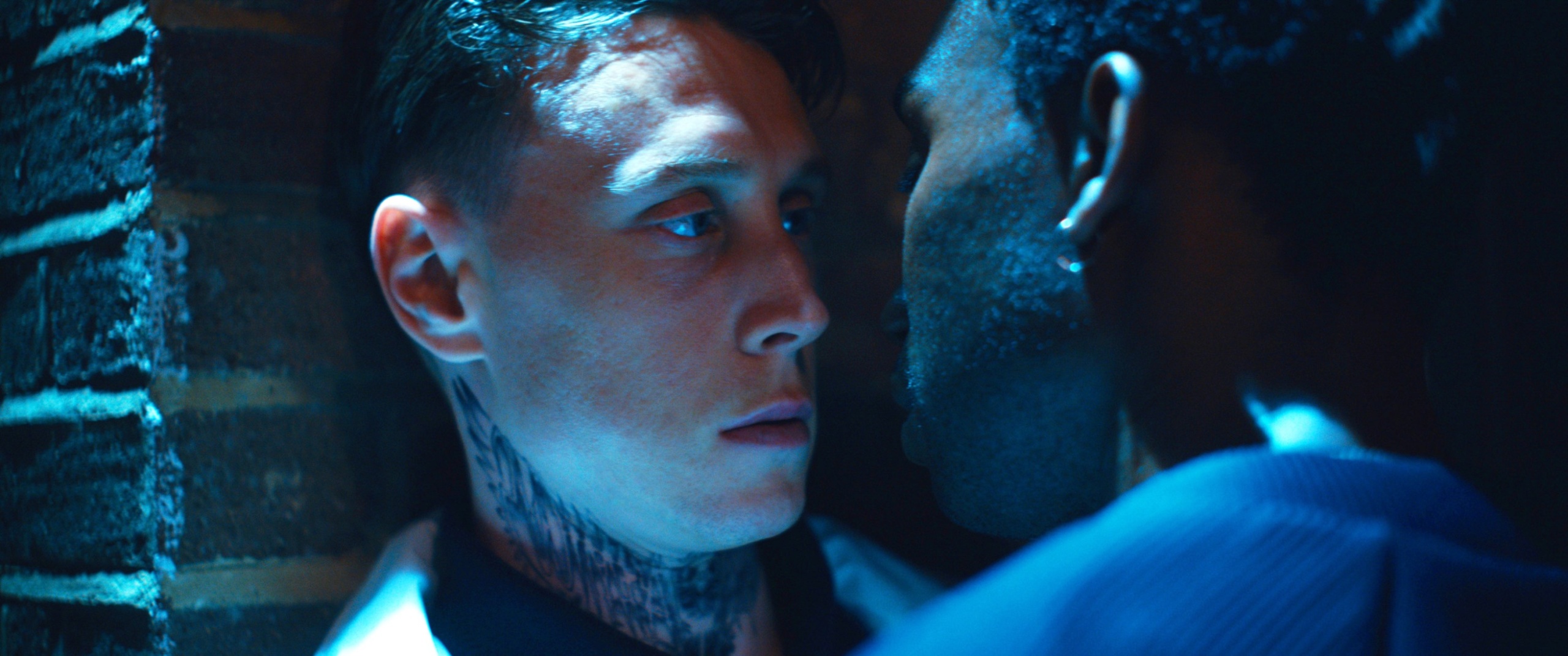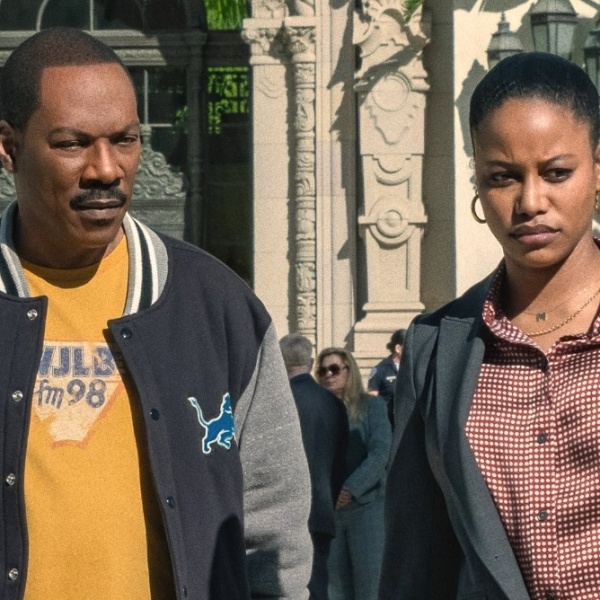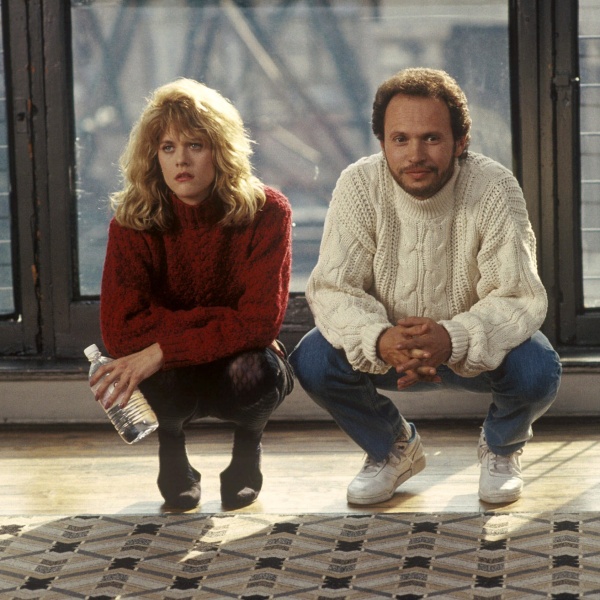
In our cancel-happy times, there’s hardly room for an empathy-for-all approach to identity-based violence and abuse. Enter Sam H. Freeman and Ng Choon Ping’s “Femme,” a bruiser of a British queer revenge thriller that plunges straight into the gray areas that can form between attacker and victim.
Retrofitting the pages of ‘90s erotic suspense films to a 2023 sensibility, “Femme” stars Nathan Stewart-Jarrett (breakout of “Culprits”) as a Black drag queen who, after being assaulted by a white, closeted street thug played by George MacKay, reaps revenge by seducing his attacker, who later doesn’t recognize him out of drag. But in the process, fraught tenderness and attraction form between Jules (Stewart-Jarrett) and Preston (MacKay), making Jules’ calculated act of vengeance — and the film itself — that much more complicated.
Unfolding almost entirely at night against the neon-dappled backdrop of the East London underground, “Femme” near-fully pulls off its devastating double bill: There’s the film’s visceral exploration of the trauma spinning out of a homophobic attack, and then there’s the exploration of the tricky feelings that emerge when two people are bonded by violence. There’s the Jules dissolved to a shell of a human after getting beaten up, and the Jules who’s starting to feel empathy for his attacker. Meanwhile, there’s the screen of machismo Preston puts up to cope with the sexual orientation he disguises under his own “drag”: neck and sleeve tattoos and an unambiguously masculine physique and dress. (A physical transformation that weirdly suits the British actor.) That “Femme” makes you care about him, too, is a rare feat.
After a show-stopping performance under the persona of Aphrodite Banks, Jules, still in drag, stops one night in a convenience store, where he catches the eye of Preston looming from afar. Preston is obviously cruising him, but quickly packs up his longing eye when he’s joined by a rabble of his bro-y friends. They proceed to taunt Jules, a tall and imposing figure in six-inch heels beneath the drag, who fires back with the sort of self-preserving retort reserved only for a queer person who’s been kicked around before.
The encounter escalates into a brutal attack that leaves Jules bloodied and naked on the pavement. Freeman and Ng stage the beating in horrific detail. They never return to the scene in flashback, but it’s harrowing enough to linger in our imaginations, always there as a glitching memory that asks us to question our empathy toward Preston in the remainder of the film.

Cut to some time later, and Jules has stopped doing drag, preferring to be a shut-in in the co-op living space he shares with his lively queer found family. Stewart-Jarrett compellingly conveys just how shut down Jules is, benefitting from a screenplay that avoids didactic exposition to instead linger on the psychic fallout of abuse visually, with few words. Attempting to get back out into the real world, Jules heads to a bathhouse, where he sees who else but Preston, seen brushing off come-ons and uncomfortable in his own tattooed skin. Their lockers happen to be right next to each other, and Preston, having no idea who Jules is, invites him back to his apartment.
You can see the gears turning already behind Jules’ eyes, not to mention his visible fear, as to how he might bait-and-switch Preston to get back at him. Problem is, there’s an obvious mutual physical attraction layered on top of that. As they’re about to have sex, Preston’s roommates stumble home, sending Preston into a panic and trapping Jules in his room while he tries to triage the situation. But what a clever man Jules is, announcing himself in the living room fully dressed and even winning over Preston’s roommates with his video game savvy while pretending to be just a friend.
Jules’ quick wits in this moment set the stage for his sly scheming that follows, as he sets out to woo Preston and eventually stage a sex tape to ruin his attacker’s reputation and out him to the world. It’s a testament to the skillful dualities of Nathan Stewart-Jarrett’s performance that we both sympathize with and start to doubt Jules’ commitment to Preston’s ruination.
And here is a movie all about dualities. In parallel to Jules’ secret plot are the very real feelings forming between the two of them — at first over a series of hasty backseat sexual encounters, and then eventually over dinners and drinks in which Preston starts to open up. MacKay’s layer cake of a performance, with Preston veering from tentative to fistfuls of rage, suggests the actor came up with a backstory that brought Preston to this place of internalized homophobia and repression. But “Femme” never opens that door, which is more refreshing than frustrating, in order to keep the film always moving forward. It’s too dangerous for Jules or Preston to look back, anyway.

It’s possible to read Jules as not having real feelings for Preston at all — until the crushing final shot — and that this really is just a seduction act. That just speaks to how “Femme” powerfully operates on multiple planes at once, mining ambiguity from an issue that’s ordinarily so black and white. To that note, on a screenplay level, “Femme” doesn’t make a fuss out of the race lines diving Jules and Preston, though Jules’ comfort in his own queer skin and Preston’s rejection of his tells you enough about the social forces that made them who they are.
Freeman and Ng adapted and expanded the film from their own 2021 short of the same name, which then starred Harris Dickinson and Paapa Essiedu. Here, they work with the same cinematographer, James Rhodes, who paints a moody nocturnal universe — shattered at one point by a startling cut to daylight as Jules, after a sleepover with Preston, walks into his kitchen to find Preston there having breakfast with his roommates.
The film’s outsides, all darkness and furtive lighting, seem to pour out of the characters’ insides, where pockets of trauma live in their own self-erected shadows. Toward the film’s conclusion, you occasionally feel the effort of a short-film concept stretched to feature length. But “Femme” ends so well, with such an unsettling lack of clarity or position, it’s enough to leave you as bruised as the complexly haunted people it has already drawn so clearly. “Femme” will hurt you.
Grade: B+
“Femme” opens in select theaters from Utopia on Friday, March 22.






